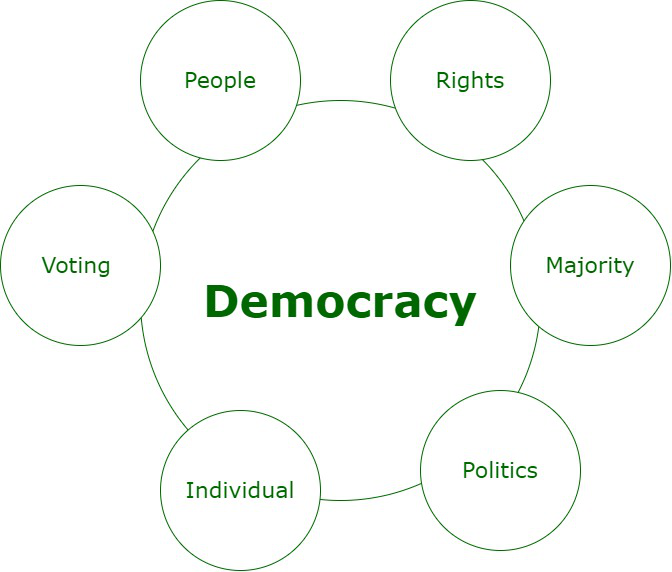Broader Meaning of Democracy
Last Updated :
16 Aug, 2023
Democracy is a form of power in which autocrats are elected by the people. It reminds us that self-government is the ground rule of the people. One chief feature common to all democracies is the government is chosen by the people.
A democratic form of government is a better form of governance because it is more accountable to the people. It also improves the process of decision-making. It provides a mechanism to deal with differences and conflicts. It enhances the dignity of citizens and allows to correct their own mistakes. Democracy is also referred to as representative democracy.
What is Democracy?
Democracy refers to the political structure where people directly exercise political power or elect members from themselves to represent the people, like that of parliament. It is also referred to as majority rule and people can’t inherit the power. People have the power to choose their representatives. The representatives participate in an election and the voters elect their members.

DEMOCRACY
How Democracy is helpful for the country?
Some advantages of democracy are mentioned below:
- Democracy helps and explains the importance of maintaining law and order.
- Democracy helps the citizens to choose leaders to run the government.
- Democracy provides equal rights among citizens on the base of caste, religion, and sex.
- A republican government is a better jurisdiction because it is an additional responsible person of the government.
- Democracy improves the efficiency of decision-making.
- Democracy provides a system to deal with disputes and conflicts.
- It is suitable for countries like India. India has a diversity of languages, persuasion, and societies. The Republic of India makes it possible to celebrate harmony in diversity.
- Democracy is one of the superior specialized forms of jurisdiction because it allows us to correct our wrong presumptions.
- Democracy enhances the dignity of citizens, as it is based on the principle of political coordination, based on the belief that the poorest and least educated have equal status as that of the rich and educated.

Broader Meaning of Democracy
The most familiar form of democracy in our time is that of representative self-government. In republican countries; the whole population doesn’t rule; the majority is allowed to hold ground on behalf of the people and they don’t rule directly but through their marked representatives. It becomes necessary because
- Ultramodern democracies are based on mass population and it isn’t physically viable to sit and collaborate on an idea or reform.
- Even with the slightest possibility, citizens don’t have the energy, time, or desire to choose and engage in all the ideas.
It gives us a clear but minimal understanding of the republic. This transparency helps us differentiate democracies from non-democracies. But this does not allow us to differentiate between a democracy and a good democracy. For this, we have to turn to the broader meaning of democracy.
Every democracy has to try to ascertain the ideals of popular judgment-making. This can not be achieved formerly and for all. This requires constant trouble to save and strengthen popular forms of decision-making. What we do as citizens can make a difference in making our country more or less popular. This is the strength and weakness of democracy, the condition of the country does not depend on what the autocrats do, but on what we do as citizens.
A decision in a democracy involves the participation and consent of all those affected by the decision. Those who are not so superior have the same power as those in power. This application is possible for a government, family, or any other organization. Thus, democracy is also a principle that can be applied to any other sphere of life. It helps to sort a parity in any situation or circumstance in day-to-day life and helps to better the position of all involved and bring parity.
This is what distinguishes democracy from other unequal governments. Different forms of government such as monarchy, dictatorship, or one-party rule do not tolerate all citizens to participate in politics. Most non-popular governments want citizens not to participate in politics. But democracy depends on the functioning of the political participation of all citizens. Therefore, the study of democracy should focus on popular politics.
Some challenges to proper functioning of Democracy:
- Social and Economic inequality: Discrimination based on religion, caste, and race causes social inequality.
- Communalism: Communalism is another challenge before democracy in India. Communal conflicts have taken place several times in different states.
- Consternation: Terrorism is posing a serious challenge to democracy in recent times. Terrorism has different facets and has political, religious, and international causes.
- Illiteracy: Basic education is the strength of democracy. A major part of the Indian population is made up of illiterate
- Casteism: The caste division in India is very clear. Discrimination and dissent are rampant in many parts of the country due to caste division.
- Rational Imbalance: The economic progress of a nation requires equally balanced development.
FAQs on Broader Meaning of Democracy
Question 1: What is Democracy?
Answer:
Democracy refers to a system of governance, in which government is elected by the people. It is a way of governing in which will depends on the people.
Question 2: Which country still has direct democracy?
Answer:
The pure form of direct democracy exists only in the Swiss cantons of Appenzell Innerhoden and Glarus.
Question 3: Democracy should depend on which type of election?
Answer:
Democracy depends on fair and free elections.
Question 4: Why democracy?
Answer:
People should feel free and equal in democracy and resolvement of conflicts is done betterway in democracies as the government is accountable to people.
Question 5: Which Is the largest democracy in the world?
Answer:
India is one of the biggest democracy in the world.
Like Article
Suggest improvement
Share your thoughts in the comments
Please Login to comment...